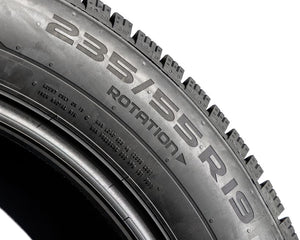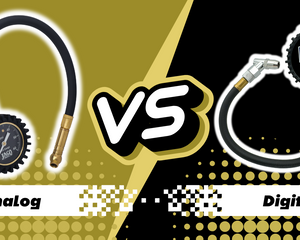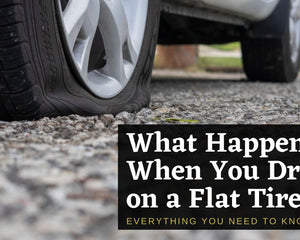
Roaring down the open road in your RV, the scenery shifting around you, and the sense of freedom is intoxicating. But the journey isn't just about the destination - it's about making sure your home on wheels gets you there safely. And a crucial element of that safety is tire pressure. Yes, you heard right! Managing your RV tire pressure is a cornerstone of RV safety and efficient handling.
This comprehensive guide will unfold everything you need to know about your camper tire pressure. From understanding the basic concept of tire pressure to its role in safety, fuel efficiency, and tire lifespan, we've got you covered. So, buckle up, adventurers, we're about to get technical!
Understanding Tire Pressure
What is Tire Pressure?
Let's start at the very beginning. What is tire pressure? Simply put, tire pressure is the amount of air in your tire, typically measured in pounds per square inch (PSI). It's the lifeline that keeps your tires healthy and your RV dancing smoothly on those winding roads.
Why is Tire Pressure Critical for RVs?
Now, you might be wondering, "Why all this fuss about tire pressure, especially for an RV?" Well, due to the considerable size and weight of RVs, the correct motorhome tire pressure is even more critical. It's not just about avoiding a flat tire in the middle of nowhere (though that's important too!). It's about ensuring your vehicle handles correctly, maximizes fuel efficiency, minimizes tire wear, and, most crucially, keeps you and your loved ones safe on the road.
Understanding and maintaining your RV tire pressure is akin to being the maestro of a well-conducted orchestra - with everything in harmony, your RV will perform at its best. Stay with us as we dive deeper into the importance of RV tire pressure and how to master its management.
RV Tire Pressure Basics
Unique Characteristics of RV Tires
RV tires are a different beast compared to the tires on your everyday vehicle. They're designed to support heavier loads, withstand varying road and weather conditions, and often go through prolonged periods of stationary storage. This makes RV tire pressure management unique, requiring dedicated understanding and regular monitoring.
Factors Influencing RV Tire Pressure
Several elements can influence your camper tire pressure. Let's delve into the most common ones:
- Load: Overloading your RV can increase the strain on your tires and alter the optimal tire pressure. Ensure to stay within your RV's recommended load limit.
- Temperature: Tire pressure can fluctuate with temperature changes. A general rule of thumb: for every 10 degrees Fahrenheit change, tire pressure can change about 1 PSI.
- Altitude: As you ascend to higher altitudes, the tire pressure increases. It's recommended to check the tire pressure after significant altitude changes.

The Importance of Correct RV Tire Pressure
Impact on RV Handling and Stability
Imagine navigating a steep mountain road or taking a tight turn, and your RV doesn't respond as it should. Scary, isn't it? Correct motorhome tire pressure helps ensure your vehicle's responsiveness, handling, and stability, making your journey safer and more comfortable.
Tire Pressure and Fuel Efficiency
Did you know that maintaining the correct tire pressure could save you a trip to the gas station? Underinflated tires can increase rolling resistance, leading to higher fuel consumption. Simply by keeping your tires properly inflated, you can enhance your RV's fuel efficiency and save on those fuel costs!
Tire Longevity and Tire Pressure
Your RV's tires are an investment, and you surely want them to last. Underinflated or overinflated tires can lead to uneven tread wear, reducing the lifespan of your tires. But, with proper tire pressure management, you can ensure your tires wear evenly and extend their longevity. In the long run, this could save you from premature and potentially costly tire replacements.
Dangers of Incorrect RV Tire Pressure
Risks of Overinflation and Underinflation
Both overinflation and underinflation of your RV tires pose significant dangers. Overinflated tires become rigid and overly susceptible to punctures and road damage. The reduced contact area with the road can lead to less traction and a bumpier ride.
Underinflated tires, on the other hand, flex more than they should. This excessive flexing leads to heat buildup, which can cause premature tire wear, tread separation, and even blowouts. Plus, underinflation can reduce handling and braking efficiency—compromising your safety on the road.
Role of Tire Pressure in RV Tire Blowouts and Accidents
A blowout on an RV can be a frightening experience and lead to dangerous accidents. A leading cause of blowouts is incorrect RV tire pressure. As mentioned, underinflated tires can heat up and fail, while overinflated tires are more vulnerable to punctures and road debris. Regular tire pressure checks are a critical part of your journey's safety planning.

How to Determine the Right Tire Pressure for Your RV
Understanding Tire Pressure Recommendations
The first step to knowing the right tire pressure for your RV is understanding the manufacturer's recommendations. These can usually be found in the RV's owner manual or on a sticker located somewhere in the vehicle, typically inside the driver's door.
Factors to Consider for Your RV's Optimal Tire Pressure
When determining your RV's camper tire pressure, you'll need to consider a few factors:
- Weight: Your RV's total weight, including all gear and passengers, will impact the necessary tire pressure. It's important to distribute weight evenly and avoid overloading.
- Temperature: As noted before, changes in temperature can affect tire pressure. Check and adjust as necessary during large temperature shifts.
- Altitude: Higher altitudes will increase your tire pressure, so adjustments may be necessary when planning a trip up into the mountains.
Adjusting Tire Pressure for Different Conditions and Loads
Lastly, different driving conditions and loads may require you to adjust your motorhome tire pressure. A fully loaded RV may need higher tire pressure compared to when it's empty. Similarly, if you're heading into hot weather or high altitudes, adjustments may be necessary. It's recommended to check your tire pressure under these changing conditions to ensure it's always in the optimal range.

Checking and Adjusting Your RV's Tire Pressure
How to Check Tire Pressure
Checking your RV tire pressure is a simple process that only takes a few minutes. Here are the steps:
- Ensure your tires are cool. Measurements should be taken before you've driven your RV or at least three hours after driving.
- Remove the valve cap on your tire.
- Press your tire pressure gauge onto the valve stem and read the pressure.
- Repeat for all your tires and note down their pressures.
The Right Tools for the Job
For this task, you'll need a reliable tire pressure gauge. There are several types available, but a digital tire gauge usually offers ease of use and precision. Some analog models, like the EliteProPlus Tire Pressure Gauge by JACO, are specifically made for RV and trailer tires. Below are our top three tire pressure tools for RVs, campers, and trailers.
Recommended RV Tire Pressure Gauges
1. JACO ElitePro Digital Tire Pressure Gauge - 200 PSI
This professional accuracy digital tire pressure gauge is capable of measuring up to 200 PSI, and also features a built-in air bleeder valve on the neck for lowering tire pressure. The tire valve chuck on the end of the hose can be threaded off and replaced with other 1/4 inch NPT attachments, such as a dually air chuck for dual wheel RV setups. Features a bright LCD display with LED backlight for use in dark conditions.
2. JACO EliteProPlus Tire Pressure Gauge - 160 PSI
Super reliable analog tire gauge with a dial type display that reads up to 160 PSI. The set includes two air chucks, a brass right angle chuck and a dually chuck for dual wheel trailers and RVs. Features a bleeder valve on the neck to lower tire pressure. The dial even glows in the dark for use in low light conditions.
3. JACO FlowPro Digital Tire Inflator with Pressure Gauge - 200 PSI
This robust tool boasts a high-accuracy digital pressure gauge that registers up to 200 PSI. With the added ability to connect to an air compressor line, the FlowPro can quickly and efficiently inflate your RV tires with precise accuracy. This model also features a built-in bleeder valve for deflating overinflated tires.
When and How to Adjust Your RV's Tire Pressure
Adjustments to your camper tire pressure may be needed after checking if it's outside the optimal range. If it's too high, let some air out until you reach the correct pressure. If it's too low, use an air compressor or inflator to add air. Check the pressure frequently during this process to avoid overinflation.
Regular RV Tire Pressure Maintenance Tips
How Often to Check and Adjust Tire Pressure
You should check your RV's tire pressure at least once a month and before every long trip. Remember, tire pressure can change with fluctuations in temperature and altitude, so make adjustments as necessary.
Seasonal Maintenance Tips
Changes in seasons can affect your motorhome tire pressure. Cooler temperatures can cause tire pressure to drop, while warmer temperatures can lead to an increase. Check your tire pressure more frequently during seasonal transitions.
Recognizing and Addressing Common Tire Pressure Issues
Keep an eye out for signs of tire pressure issues like uneven tire wear, vibration while driving, or decreased fuel efficiency. If you notice these problems, check your tire pressure and adjust it as needed. If the issue persists, it may be time to consult a professional to check your RV's alignment and suspension.
Final Thoughts
In this comprehensive guide, we've emphasized the critical nature of RV tire pressure management. Properly maintaining your camper tire pressure will not only ensure a smooth and safe journey, but it will also boost your RV's fuel efficiency and prolong the lifespan of your tires. Remember, your adventures on the open road are only as good as the tires you're riding on, and their health hinges on correct tire pressure.
So, What Should You Do?
Equip yourself with the right tools to manage your RV's tire pressure. A quality tire pressure gauge and inflator can make the difference between a minor check and a major issue down the road. At JACO, we offer top-of-the-line tire pressure tools designed to keep your adventures rolling safely and smoothly.
Remember, adventures are better when they're worry-free. Stay safe, stay informed, and let's keep exploring the open road together!








